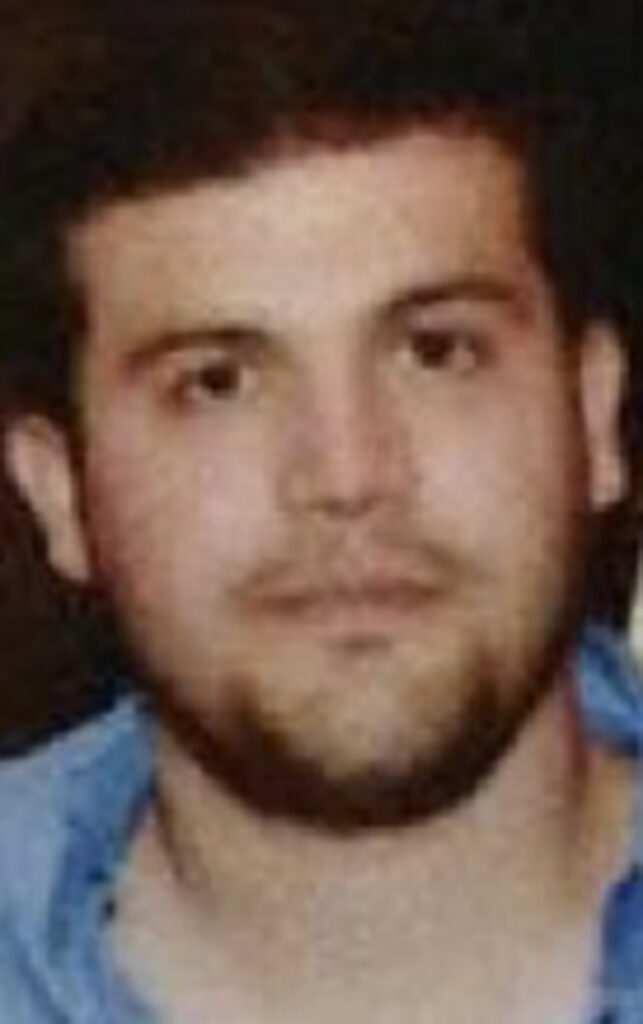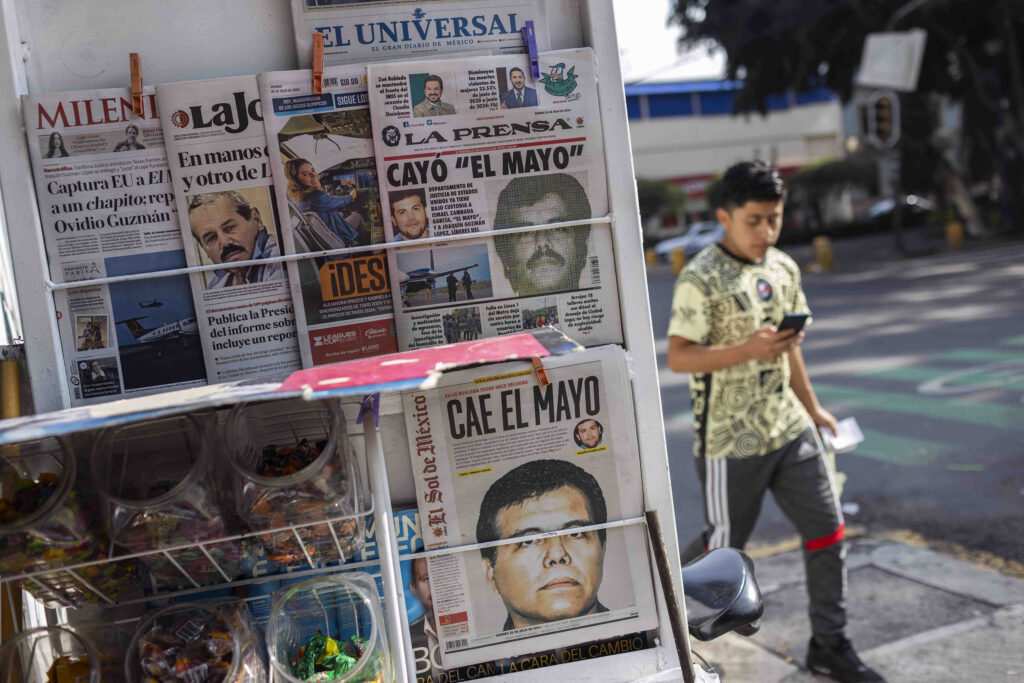A son of former Sinaloa cartel boss Joaquin “El Chapo” Guzman was due to be arraigned in Chicago’s federal court on Tuesday as intrigue continued to swirl over how he ended up delivering himself and his father’s former partner, the elusive Ismael “El Mayo” Zambada, into the hands of federal authorities in Texas.
Joaquin Guzman Lopez, 38, one of four sons collectively known as the “Chapitos,” is under indictment in Chicago on sweeping narcotics trafficking charges alleging he helped lead a faction of the notoriously violent Sinaloa cartel after his father’s arrest eight years ago.

His arraignment at the Dirksen U.S. Courthouse is scheduled to begin at 11:30 a.m. before U.S. District Judge Sharon Johnson Coleman. Security will be tight and cell phones and other electronics have been banned from the courtroom.
No lawyer for Guzman Lopez was listed on the court docket as of Friday morning.
Guzman Lopez has been in custody at the Metropolitan Correctional Center in downtown Chicago since Friday, a day after his arrest at a small airport near El Paso on a private plane that was also carrying Zambada Garcia, the notoriously elusive Sinaloa cartel co-founder who is also under indictment.
The plan landed apparently with little warning to U.S. authorities, who had to scramble agents to make the arrests. Zambada Garcia appeared last week in U.S. District Court in El Paso and waived his right to a detention hearing, pleading not guilty through his attorney to charges filed there.
The stunning news of Guzman Lopez’s and El Mayo’s arrests was announced by U.S. Attorney General Merrick Garland on Thursday night in what appeared to be a hastily arranged written statement.
“The Justice Department has taken into custody two additional alleged leaders of the Sinaloa Cartel, one of the most violent and powerful drug trafficking organizations in the world,” Garland said. He said Zambada Garcia and Guzmán López both face multiple charges “for leading the cartel’s criminal operations, including its deadly fentanyl manufacturing and trafficking networks.”

In the hours that followed, the international intrigue spread and various conflicting stories began to emerge in the media, including one from an anonymous Mexican official that Zambada Garcia had turned himself in, and another claiming Lopez had duped Zambada Garcia into boarding the plane by telling him they were going to look at some property for sale near the U.S.-Mexico border.
Zambada’s Dallas-based lawyer, however, later pushed back against that version, claiming his client was violently kidnapped.
“My client neither surrendered nor negotiated any terms with the U.S. government,” attorney Frank Perez said in a statement. “Joaquín Guzmán López forcibly kidnapped my client. He was ambushed, thrown to the ground, and handcuffed by six men in military uniforms and Joaquin. His legs were tied, and a black bag was placed over his head.”
Perez said Zambada Garcia was then “thrown into the back of a pickup truck and taken to a landing strip.”
“He was forced onto a plane, his legs tied to the seat by Joaquin, and brought to the U.S. against his will,” Perez said. “The only people on the plane were the pilot, Joaquin and my client.”
A leader of the powerful Sinaloa cartel for decades alongside El Chapo, Zambada Garcia was known for running the cartel’s smuggling operations while keeping a lower profile. The U.S. Drug Enforcement Administration had offered a reward of up to $15 million for information leading to his capture.
Unlike El Chapo, Zambada Garcia had operated largely out of the glare of public and media attention. He wasn’t labeled Public Enemy No. 1. He dresses simply, prefers life on one of his many cattle ranches to extravagant parties, yachts or beachside nightclubs. Those who know him often referred to him as “Del Sombrero,” after his trademark wide-brimmed cowboy hat.
“He’s a straight-up rancher, old school,” said Pedro Flores, the convicted drug trafficker from Chicago’s Little Village neighborhood who, along with his twin brother, helped the U.S. government bring indictments against a slew of Sinaloa figures, including Zambada and Chapo. “The way he treated people, he was the most understanding … always looking to please the people around him.”
Flores spoke to the Tribune last week with his longtime attorney, Robert Rascia, following the bombshell news of Zambada Garcia’s arrest.
“It is a big win for the U.S. government,” said Flores, who is living in an undisclosed location after completing his 14-year prison sentence.
El Mayo’s arrest is in many ways the culmination of the extraordinary cooperation that the Flores twins embarked on nearly two decades ago, agreeing to work with DEA agents while still living in Mexico and dealing directly with Sinaloa’s upper echelon leaders.
While much was made of the recordings the twins made of El Chapo, both Peter Flores and his brother, Margarito, told the Tribune that they dealt more often with Zambada, who embodied many of the same characteristics as their father, Margarito Sr.
Margarito Flores, who goes by the nickname Jay, recalled in an interview Friday how Zambada “never used the phone, ever,” preferring to meet face-to-face at one of his many ranches around central Mexico. He said some of those meetings took place under the shade of a tree, not some gilded office, where Zambada would on the ground in his Timberland boots.
“It was simple. It wasn’t Tony Montana in ‘Scarface,’” he said. “He reminded me a lot of my father.”
El Mayo’s arrest comes more than a decade after his son, Vicente Zambada-Niebla, the onetime heir-apparent to the Sinaloa cartel, was arrested on charges brought in Chicago and eventually agreed to cooperate against his father and other cartel leaders.
Zambada-Niebla, nicknamed “Vicentillo,” admitted playing a key role in trafficking thousands of pounds of cocaine and heroin into the U.S. using speedboats, submarines and jumbo jets. He had faced the possibility of life in prison, but was sentenced to 15 years in 2019 after then-U.S. District Chief Judge Ruben Castillo credited him for what prosecutors had called his “unrivaled” cooperation.
Known for his flashy lifestyle and hard partying, Zambada-Niebla was arrested by Mexican authorities in 2009 after the Flores twins — who were among the cartel’s biggest drug distributors — made recordings of Zambada-Niebla talking about massive drug shipments, obtaining grenades and explosives, and even attacking government buildings in Mexico in retaliation against law enforcement.
“El Chapo” Guzmán was sentenced to life in prison in the U.S. in 2019.
Another son of Zambada’s, Ismael Zambada Imperial, pleaded guilty in U.S. federal court in San Diego in 2021 to being a leader in the Sinaloa cartel.
Meanwhile, in recent years, Guzmán’s sons have lead a faction of the cartel known as the little Chapos, or “Chapitos,” that has been identified as one of the main exporters of fentanyl, a deadly synthetic opioid, to the U.S. market.
One of them, Ovidio Guzmán López, was arrested and extradited to the U.S. last year. He pleaded not guilty to drug-trafficking charges in Chicago in September and is being held without bond.
Guzmán López was among 28 reputed members of the notorious Sinaloa cartel charged as part of a multijurisdictional fentanyl-trafficking investigation unveiled in April by Garland, U.S. Drug Enforcement Administration Administrator Anne Milgram and other top federal prosecutors, including acting Chicago U.S. Attorney Morris Pasqual.
In outlining the charges, Garland described the violence of the Sinaloa cartel and how its members have tortured perceived enemies, including Mexican law enforcement officials. In some cases, cartel members also have fed victims, some still alive, to tigers owned by Guzmán’s sons, Garland said.
The superseding Chicago indictment, which was filed under seal in January 2023, alleged Guzmán López assumed day-to-day control of the cartel after his father’s arrest in 2016. The indictment accuses the sons of orchestrating the shipment of thousands of pounds of cocaine, marijuana and other drugs into the U.S. by rail, road and through tunnels and other means.
The sons allegedly furthered the conspiracy by bribing public officials and using guns and other dangerous weapons to commit violence, including murder, kidnapping, and assault “against law enforcement, rival drug traffickers and members of their own trafficking organization,” the indictment alleged.
Guzmán’s other sons charged in Chicago, Jesús Alfredo Guzmán Salazar and Iván Archivaldo Guzmán Salazar, remained at large as of Tuesday.
___
© 2024 Chicago Tribune
Distributed by Tribune Content Agency, LLC.



